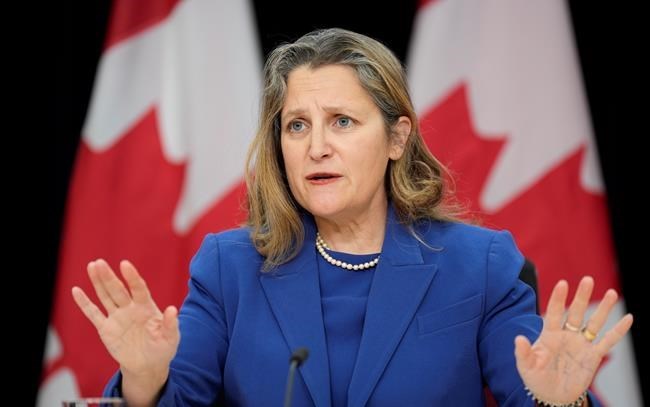
<p>Former Deputy Prime Minister and Finance Minister Chrystia Freeland speaks with reporters in Ottawa, Tuesday, Dec. 10, 2024. THE CANADIAN PRESS/Adrian Wyld</p>
January 21, 2025 - 1:00 AM
OTTAWA - The three frontrunners in the Liberal leadership race have all backed away — to one degree or another — from the Liberal government's keystone climate policy in a bid to take a major Conservative line of attack off the table.
The Liberals first campaigned on a carbon price in 2008 and moved to make it happen following Prime Minister Justin Trudeau's election win in 2015.
It was first implemented in 2019 and is a critical piece of the federal climate plan. It also has been a political football and a favourite target of Conservative attacks.
Liberal leadership candidates Chrystia Freeland, Karina Gould and Mark Carney have all cooled on consumer carbon pricing in recent weeks.
Freeland, who launched her campaign Sunday, is indicating she will abandon consumer carbon pricing altogether, acknowledging that Canadians don't want it.
"That's what the people are saying to us, and democracy is about listening to people," Freeland said Monday on CP24's Breakfast, indicating she still supports industrial carbon pricing.
An analysis published in March 2024 by the Canadian Climate Institute found Canada’s carbon price could slash greenhouse gas emissions by more than 100 million tonnes a year by 2030, but only about one-fifth of that would come from the consumer carbon price.
Most of that reduction would come from putting a price on emissions from big industry, including oil and gas.
Freeland has defended the government's carbon policy for years. Through 2021 and 2022, the former deputy prime minister rose several times in the House of Commons to defend the policy, saying at one point the price on pollution is "by far the most economically effective way to achieve climate action."
"In my view there's only one reason why any current Liberal would start distancing themselves from the carbon price, and that is that the opposition is making headway in fighting against the carbon tax," said Chris Ragan, the founding director of McGill University’s Max Bell School of Public Policy.
"And for some reason, it seems to me they're probably doing it because they think it's going to help their leadership prospects, or their subsequent election prospects."
Conservative leader Pierre Poilievre has pitched the upcoming election as almost a referendum on carbon pricing and the Conservative Party has launched ads attacking Liberal leadership contenders for defending the policy. Freeland's campaign pushed back against that narrative on Monday.
"Andrew’s mad he’s now stuck with boxes of ‘axe the tax’ election merch," Freeland's camp posted on X, in response to a post by Conservative MP Andrew Scheer highlighting Freeland's previous defence of carbon pricing.
Ragan said that while nothing fundamental has changed in how carbon pricing works, its political narrative has turned Canadians off.
"I think it is actually a pretty well-designed policy. I think it was a reasonably well-implemented policy. I do agree it was a terribly-communicated policy," he said.
"I find it very difficult to believe that they now, for some reason, believe that the carbon price is not a good policy. It seems to me it's kind of an act of, frankly, political desperation to start thinking about abandoning or softening their support for a carbon price."
Karina Gould, who also launched her Liberal leadership campaign on Sunday, pledged to freeze the carbon price but not to abolish it.
"We need to immediately cancel the increase to the price on pollution ahead of April 1," she said, adding that the Liberal party needs to make electric vehicles and efficient home heating more affordable.
Just five months ago, Gould told the House of Commons climate change poses an "existential threat."
"That means we have to have a comprehensive plan when it comes to the price on pollution, the work to do with industry partners and investments in clean technology," she said in September.
Gould defended the policy just a month ago by citing studies indicating the carbon tax wasn't responsible for increases in food prices.
Carney has been less clear about his plans for both consumer and industrial carbon pricing.
In 2021, while attending the annual UN climate talks taking place that year in Scotland, Carney participated in a panel with Trudeau discussing the need for more countries to price carbon as an way to drive down emissions.
"Everyone should try and have a price on carbon," he said at the time.
Last May, after he'd started planning his leadership run, Carney said the carbon price in Canada had "served its purpose until now" but opened the door to alternatives, as long as they cut equivalent amounts of emissions.
During his leadership launch in Edmonton on Jan. 16, Carney reiterated his argument that if the carbon price is going to go, it has to be replaced "with something that is at least, if not more, effective."
"Because perception may be that it takes out more than the rebate provides, but reality is different," he said. "And Canadians will miss that money, so you need a comprehensive approach, you need a comprehensive plan."
Carney was referring to the carbon rebates. The Parliamentary Budget Officer has said the rebates exceed the direct cost of the carbon price for most Canadians.
This report by The Canadian Press was first published Jan. 21, 2025.
News from © The Canadian Press, 2025